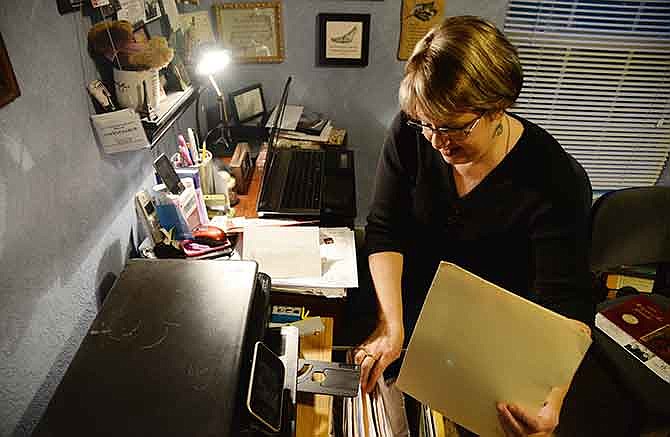Each January, families make resolutions for the new year. As 2015 begins, "get organized" will undoubtedly top many lists.
Professional organizer and owner of Managed Chaos, LLC, Laura Forbis recommends a little hard work to get organized, but forming good habits to stay that way.
To keep things from cluttering up, Forbis has a few suggestions to improve each home's traffic pattern and paper flow - dealing with these issues can ultimately dial down stress levels and may inspire a more organized future.
Create a "catch-all'
"I recommend creating a launch pad according to your traffic pattern," Forbis said.
The local organizer created her own "launch pad" when she noticed a routine in her Jefferson City home. When family entered the house through the laundry room, they often neglected to walk to the hall closet on the other end of the house to hang up their coats. Those coats ended up in the kitchen or scattered throughout the house. By hanging a shelf with hooks and a key holder near the popular entry, Forbis noticed an immediate decrease in clutter.
"You should have one set spot where they set their stuff," Forbis instructed.
Having a mud room or designated entry isn't always possible, so making the most of one's space is key. Try using a small bench with baskets tucked underneath and hooks hung above, or simply placing a coat rack in the corner near the door.
Paper cut
Aside from clothing and closets, Forbis said her clients also tend to struggle with paper. The inevitable "paper pile" often grows and grows with each passing day.
"I always say, "Touch things one time.'"
If it's trash, throw it away immediately. If it needs to be shredded, Forbis recommends shredding it right away or at least putting it in a designated shredding box or basket. Bills should have a designated location, too, so no matter who gets the mail that day, he or she knows exactly where to place them.
"If you can deal with the paper as it comes," Forbis said, you'll be much better off.
And, of course, you have to create a mail slot or folder for each member of the family, where they'll know immediately where to find that card Grandma sent or their latest college acceptance letter.
An easy system Forbis recommends is having a manila envelope to catch all the bills before going through them once a week so as not to get behind.
And for the busy moms and dads out there, a "red light/green light" system may be best. Forbis said the system might take a few tries to get used to, but is very efficient once the family makes it routine. Children simply place any papers their parents need to see or sign into a red envelope or folder each afternoon when they get home from school. The parents look at the folder before going to bed, placing the items into the green folder before morning. The children check the green folder before heading to school, taking with them the papers signed by their parents.
Start now
As Christmas decorations come down, Forbis recommends starting the new year right. Using clear storage containers or descriptive labels will help next year's set-up.
"Make note of light strands and write it down. I keep a running list of how many lights I need, both inside and out," Forbis said.
"When you're putting things away, if it's broken, throw it away, even if it's sentimental."
And if you know what other decorations you might need next year, go ahead and get them during the after-Christmas sales before putting your decorations in storage.
Although every room in the house needs to be organized eventually, taking small steps can really make a difference. For those who struggle with throwing things away, Forbis says this: "If it's important, treat it that way."
Being organized doesn't mean throwing everything out. It means creating good habits for daily living, displaying the sentimental stuff, and designating a system for your most important items.
When to pitch it
Tax records: Tax returns and supporting documents like W-2 forms and receipts should be kept for seven years.
Credit card statements - Once you've checked their accuracy, shred these immediately so as not to be used for identity theft.
Paychecks: One year, or until you've received your W-2.
Bank statements: One month. You only need these long enough to check their accuracy.
Life insurance policies: Keep these indefinitely, along with any estate planning documents, like wills, trusts and powers of attorney.
Vehicle records: Keep these as long as you own the vehicle.
Christmas cards: Unless you're planning to display them throughout the year, it's okay to pitch these after the holidays. You may, however, be able to up-cycle a few into holiday décor by putting them in a frame for next year.
Your children's artwork: Forever! If it's valuable, find a way to display it. Create a scrapbook with your favorites or a file you can give back to your kids once they're grown.


